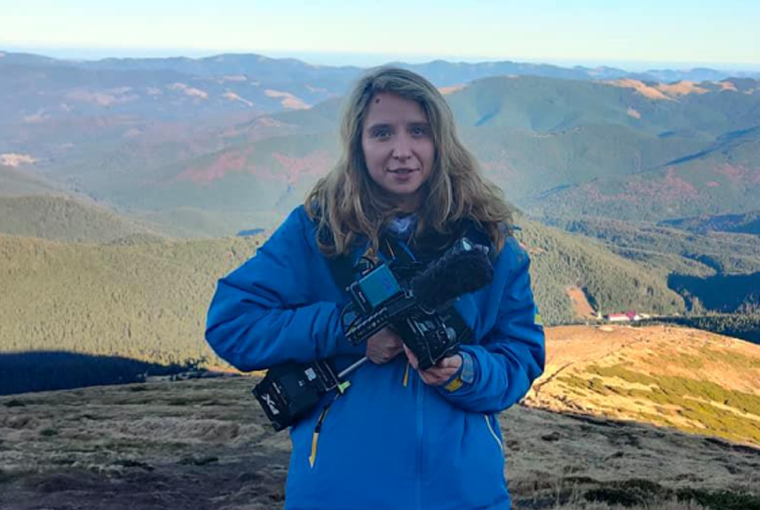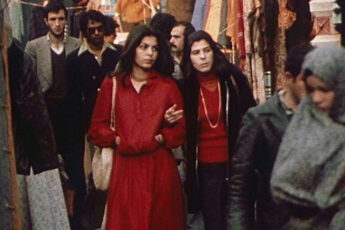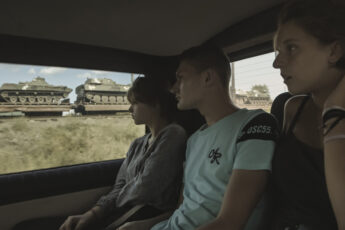
We met Ukrainian filmmaker Alisa Kovalenko during the Berlin International Film Festival (16-26 February 2023), where her documentary feature “We Will Not Fade Away” screened in the Generation 14plus section. Kovalenko discusses the development of the project, recent political developments in Ukraine, and future projects.
What was your initial point of departure when starting the documentary?
I met a famous Ukrainian explorer, Valentin [Sherbachov], in Kyiv in 2018 and he shared his dream with me about an adventure therapy trip. Valentin has actually made lots of projects for children, he’s worked on several social projects for children. So we met and he told me about this dream and I found it beautiful so I decided to join him. That’s how we started, and I filmed the whole process – the preparation, the open calls… He gave a lot of interviews on local Donbas TV and we went to Donbas together to meet many children and schools. He received letters from children and teenagers, which I read. So that was the process in the first period.
That’s very different from the approach taken in the final film. How did you shape it along the way?
Yeah, it changed a lot in terms of perspective. In the beginning I was thinking that it would be more about this process and the expedition, and that Valentin would be in it more. But the more time I spent in Donbas, I realized that this film should be told from the perspective of teenagers, through the eyes of teenagers. It’s not about the expedition, it’s not about the mountains or adventure therapy, it’s actually about the power of dreams and how you can still believe in your dreams when you are living in this kind of depressing place that isn’t very friendly to you and isn’t helping you to realize your goals. But you keep believing, and you put a lot of light in the middle of the darkness. So for me that became the main point and I totally changed the direction and perspective.
The focus of the film is so strongly on the kids and not the trip that it’s hard to imagine it was ever the other way around.
I spent so much time with them. In the beginning we filmed with a cameraman and afterwards I filmed by myself. So I mostly filmed by myself for two years and after all that time spent together I realized that I really want to talk about the daily life of teenagers, and that I was less interested in the project in the mountains. It actually became metaphorical. It’s not about going to see the mountains, it’s about conquering your inner mountains.
Did the kids accept you right away or did it take some time?
It was different with each of them. With Andriy for example it was immediate, and I hung around with his friends, so I started to think that I was a teenager as well. It was really funny. Others needed time, like Ruslan. He’s very shy, so it was much more complicated for him to open up. He’s not confident in himself and so it took time. Ilya was very good. Lera was also a bit shy at the beginning, but she opened up like a flower, and she became much more open and more confident later on. Liza is a tough guy, so sometimes it wasn’t easy with her. But overall, the process was normal.
As you said, the trip to the Himalayas is mostly metaphorical in the film, so I was a bit shocked when they actually went there since I had assumed it would stay a dream. Were you sure it would happen, or did you have some doubts?
At some points, I really didn’t think that it would happen. It got postponed three times because of the pandemic, so nobody believed it anymore, and then there was this escalation. We really thought it wouldn’t happen, but I thought even if it doesn’t then the film is already here. Of course it was beautiful that it happened, not so much for the film but for them. It was really important and they waited for it for such a long time. It gave them lots of hope that dreams can be realized, even through all these problems and complications.
And how was it for you to go there with them?
It was crazy. It was very hard. We were not very well prepared physically, I would say. We were dying because it was so painful, and then you have to film on top of that. You’re already at an altitude of 2000 meters, so it gets harder and harder, especially since I was acting as director and cameraman… We had a cameraman, but I filmed a lot by myself, and I had to deal with everything so I had so much responsibility. I had a lot of adrenaline, which helped. Of course, it wasn’t easy for the kids either. It’s up and down, up and down, and physically it’s very tough. We started at six o’clock in the morning and finished at six o’clock in the evening, or sometime later. And it rained at three o’clock every day, it was like someone pushed the rain button, and then it would continue raining until late. So it was hard because you had to put the rain protectors on the camera and it was very complicated to film under the rain while walking since it was slippery.
It must have been difficult to deal with electricity and batteries.
That was also very complicated because you have to pay to charge each battery. You pay for the shower and for Wi-Fi, so we were joking, “OK, shower or Wi-Fi today?” But it was a very nice experience and it brought us even closer.
Obviously, the invasion happened while you were still working on the film, so how did that change your original intentions?
I had to change everything completely. We finished the first rough cut just before the invasion, and we were thinking about going to Donbas, because Masha, our sound designer, wanted to record some atmosphere sounds. I filmed by myself, and Masha was complaining, “Why didn’t you record more atmospheres? You documentary people never think about sound!” So I said, okay, let’s go, but then the escalation started so I then I thought we shouldn’t go just for sound, but maybe it could have been included since it was a part of their lives now. And then Masha actually got Covid-19 so she didn’t go. I was on the train, and I woke up at 5 AM and the war had started with the full-scale invasion. So I was already in Donbas and Andriy and his father came to pick me up from the train station. We were driving and the radio was talking about evacuating everyone from the villages close to the front line, and that’s exactly where Andriy was living. So I spent a few days with them at the beginning of the invasion, but I didn’t feel like I could film it and I was trying to figure out how to evacuate them. In the end, I couldn’t persuade them to leave. They believed that it wouldn’t be that bad, they were used to the war already. They said, “We’ll survive, we’re well protected by the army.”
I felt like I had to do something, that I had to act, so I went to fight on the front lines. And when I came back after four months, my husband persuaded me to finish the film first before signing a contract with the army. So I watched it again and I kept crying because I realized that all of those places are gone, they’re either occupied or destroyed. And I couldn’t watch it as a film, I just had pure emotion inside me, so it was very hard to deal with that while keeping some level of distance. But it also crystallized what were the most important things, and you feel it immediately. It was still very difficult to find each of their voices, because it’s a multi character film. I’ll never make another film like this, ever! Some experts told me, “just cut some of the characters”, but I couldn’t! “But it’ll be easier!” I know it would be easier, but I don’t choose the easy way to make films, and sometimes you have to take risks, otherwise you’re not a good filmmaker. So I wanted to keep all of them, and it was the same with both of the editors, they didn’t want to cut anybody out either. So we tried to make it as a mosaic, and we also wanted to create a single portrait through all of them, a portrait of a generation, and to fit it in one space. So it was a really long process, and it was like surgery. I hope we managed to create this mosaic, but it was the hardest film I ever made in terms of editing.
How do you feel the industry has reacted to the invasion? Do you feel supported by the film community?
We received a lot of different offers to present the film as part of a Ukrainian focus, at Edinburgh and Sheffield, for example. It didn’t really have much of an impact, nobody joined the project from that, but it was nice. There was a nice sense of movement from many festivals and industry people.
How about screenings? Do you have any particular plans about where and how to show the film?
I still don’t know. It’s so hard to think in the long term, even about the cinematic release in Ukraine, for example. We can say that it’s important and we have to show the film everywhere in Ukraine, but how can we plan it when we don’t know what will happen in a month’s time? So we’ll think about it in a few months. We only just finished post-production, actually we were late giving the DCP to the Berlinale, I think we were almost the last ones. There’s never enough time. And Masha, the sound designer, came to Warsaw, which is where we were working, and she said, “We’ll never make it in time! No, no, no! It’s impossible, there’s so much work!” She was saying this every day. So we haven’t thought about it yet.
So does that mean it’s too early for you to be planning your next project?
No, I actually have a new one. I pitched it at IDFA Forum. It’s a project I didn’t intend to be a film at all. During the four months I spent on the front line I wanted to make an archive. I just filmed some things to remember them and for my son too, in case I didn’t survive, so that he would have something about me. I also filmed some of my comrades, guys from my unit, things that usually can’t be filmed. I filmed some trees and leaves, chronicles of my time there. When I got back from the front line, I just put this material somewhere and one time my friend asked me to watch two shots, she wanted to see it. So we started to watch this material and we realized that there’s something very special in it. There’s no action, you can’t build a classical narration with this material, but there is something special because it’s about routine life on the frontline that you don’t see on the screen so much. It’s like a slow Iranian film, when you see people waiting and waiting and waiting in the trenches, and they look at the trees and the grass. There’s explosions and silence, lots of silence and lots of tension, but in this material, we saw another side of the war, another side of the front lines. So that’s how I started to work on this archival material, and we are thinking how we can structure it. It will be a more experimental film, not classical storytelling, but we are still in development.
Will you shoot more or stay with the materials you’ve already shot?
I only want to use this material. There’s not a lot of material because I didn’t film that much. You know, sometimes I would just film something, but I want it to be in one space.
Is there anything regarding the war that you feel people should be aware of but aren’t?
Regarding the front lines, maybe some people would think it’s a bit crazy that I went to fight, but in Ukraine it’s not an abstract professional army that’s fighting, all of us are fighting. A month ago, a husband of our close friend died. He was a film editor, a famous film editor. There are people who built eco-houses, who were artists, who were teachers, who were professors at universities – they became fighters. All of us have taken part in it, because it’s so big you have to stop it any way you can.
Do you plan to keep living in Kyiv?
For as long as it’s possible. It was a decision based on principle, we didn’t want to leave Ukraine. But of course, it’s very complicated – deciding for yourself is one thing, but deciding for your child is hard. I have a five-year-old son and there’s a bomb shelter in his kindergarten. But we brought him with us to Berlin because we weren’t sure what might happen in Kyiv. There are a lot of predictions that Russia will attack Kyiv… I don’t think so, but it’s in the air. So in case something horrible happens we decided that we would take him with us this time. So it’s his first time in Berlin and he’s mostly with my mother since I don’t have much time.
Well, maybe in the future he will remember seeing his mum as the glamorous filmmaker…
Oh he doesn’t care about that. One time I had to go to Poland to work on post-production and he said, “Mum, why did you choose this profession? Mum, maybe should work in the supermarket. You would have more money and we would get a discount, and you would spend more time at home.” So he really doesn’t care, he would prefer me to work in a supermarket. These poor filmmakers’ children…
Thank you for the interview.




Leave a Comment